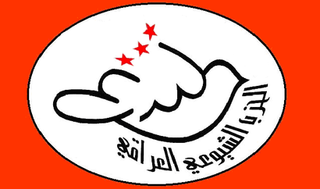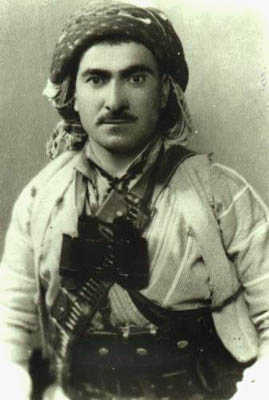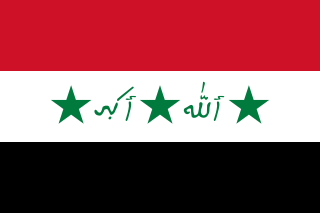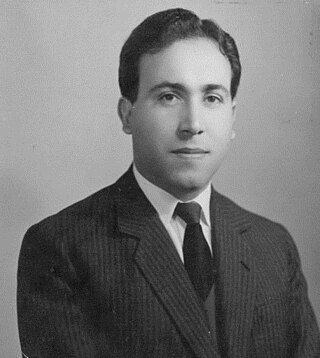
Abd al-Karim Qasim Muhammad Bakr al-Fadhli al-Zubaidi was an Iraqi Army brigadier and nationalist who came to power when the Iraqi monarchy was overthrown during the 14 July Revolution. He ruled the country as the prime minister until his downfall and execution during the 1963 Ramadan Revolution.

Jalal Talabani was an Iraqi politician who served as the sixth president of Iraq from 2006 to 2014, as well as the president of the Governing Council of Iraq. He was the first non-Arab president of Iraq.

The Iraqi Communist Party is a communist party and the oldest active party in Iraq. Since its foundation in 1934, it has dominated the left in Iraqi politics. It played a prominent role in shaping the political history of Iraq between its foundation and the 1970s. The Party was involved in many of the most important national uprisings and demonstrations of the 1940s and 1950s. It suffered heavily under the Ba'ath Party and Saddam Hussein but remained an important element of the Iraqi opposition and was a vocal opponent of the United Nations sanctions imposed on Iraq after the Gulf War of 1991. It opposed the United States invasion of Iraq in 2003 but since then has participated in the new political institutions. It received little support in the Iraqi general elections of 2005. The party reportedly gained some seats in each province in which the 2013 Iraqi governorate elections were held.

Mustafa Barzani, also known as Mela Mustafa, was a Kurdish leader, general and one of the most prominent political figures in modern Kurdish politics. In 1946, he was chosen as the leader of the Kurdistan Democratic Party (KDP) to lead the Kurdish revolution against the Kingdom of Iraq. Barzani was the primary political and military leader of the Kurdish revolution until his death in March 1979. He led campaigns of armed insurgency against both the Iraqi and Iranian governments.

Abd al-Rahman al-Bazzaz was an Iraqi politician, reformist and writer. He was a pan-Arab nationalist and served as the Dean of Baghdad Law College and later as Prime Minister of Iraq. Al-Bazzaz main political project was the professionalization of the government through increasing access to civilian expertise. That civic agenda came at the expense of the military. Al-Bazzaz was charged by the Ba'athist-dominated government of participation in activities against the government and he was tortured and imprisoned. Al-Bazzaz was finally released because of illness in 1970 and moved to London for treatment before later dying in Baghdad on 28 June 1973.
The United States (U.S.) Central Intelligence Agency (CIA) has been involved in covert actions and contingency planning in Iraq ever since the 1958 overthrow of the Iraqi monarchy, although the historiography of Iraq–United States relations prior to the 1980s is considered relatively underdeveloped, with the first in-depth academic studies being published in the 2010s.

Diplomatic relations between Iraq and the United States began when the U.S. first recognized Iraq on January 9, 1930, with the signing of the Anglo-American-Iraqi Convention in London by Charles G. Dawes, U.S. Ambassador to the United Kingdom. The historiography of Iraq—United States relations prior to the 1980s is considered relatively underdeveloped, with the first in-depth academic studies being published in the 2010s. Today, the United States and Iraq both consider themselves as strategic partners, given the American political and military involvement after the invasion of Iraq and their mutual, deep-rooted relationship that followed. The United States provides the Iraqi security forces hundreds of millions of dollars of military aid and training annually as well as uses its military bases.
The Democratic July 14 Movement was a front of Iraqi political forces, a broad unity opposing Ba'athist rule over Iraq. It emerged through the cooperation between the Iraqi Communist Party-Central Command leader Najim Mahmud, Colonel Salim al-Fakhri and others. The name 'July 14' referred to the July 14 Revolution of 1958. Al-Fakhri had been an important associate of Abd al-Karim Qasim and had been proposed as Prime Minister by the plotters of the failed Ar-Rashid revolt. The movement claimed to represent the genuine legacy of July 14, 1958 from which, according to the organization, Qasim and his military associates had deviated from.
The ar-Rashid revolt refers to a 1963 failed uprising against the Baathist government in Iraq. The revolt was plotted by followers of the Iraqi Communist Party in junction with military officers. The revolt failed to spread outside Baghdad and was crushed by the Baathist forces.

The Ramadan Revolution, also referred to as the 8 February Revolution and the February 1963 coup d'état in Iraq, was a military coup by the Ba'ath Party's Iraqi-wing which overthrew the Prime Minister of Iraq, Abd al-Karim Qasim in 1963. It took place between 8 and 10 February 1963. Qasim's former deputy, Abdul Salam Arif, who was not a Ba'athist, was given the largely ceremonial title of President, while prominent Ba'athist general Ahmed Hassan al-Bakr was named Prime Minister. The most powerful leader of the new government was the secretary general of the Iraqi Ba'ath Party, Ali Salih al-Sa'di, who controlled the National Guard militia and organized a massacre of hundreds—if not thousands—of suspected communists and other dissidents following the coup.

The Kurdistan Democratic Party, usually abbreviated as KDP or PDK, is the largest party in Iraqi Kurdistan and the senior partner in the Kurdistan Regional Government. It was founded in 1946 in Mahabad in Iranian Kurdistan. The party states that it combines "democratic values and social justice to form a system whereby everyone in Kurdistan can live on an equal basis with great emphasis given to rights of individuals and freedom of expression."

Nawshirwan Mustafa was an Iraqi Kurdish politician who served as the General Coordinator of the Movement for Change and the leader of the opposition in the Kurdistan Region from 1 April 2009 to his death on 19 May 2017.

Ba'athist Iraq, formally the Iraqi Republic until 6 January 1992 and the Republic of Iraq thereafter, covers the national history of Iraq between 1968 and 2003 under the rule of the Arab Socialist Ba'ath Party. This period began with high economic growth and soaring prosperity, but ended with Iraq facing social, political, and economic stagnation. The average annual income decreased both because of external factors such as the heavy sanctions placed on Iraq by Western countries and the internal policies of the Iraqi government.

The Iraqi Republic, colloquially known as the First Iraqi Republic, as well as Qasimist Iraq (1958–1963) and Nasserist Iraq (1963–1968), was a state forged in 1958 under the rule of President Muhammad Najib ar-Ruba'i and Prime Minister Abd al-Karim Qasim. ar-Ruba'i and Qasim first came to power through the 14 July Revolution in which the Kingdom of Iraq's Hashemite dynasty was overthrown. As a result, the Kingdom and the Arab Federation were dissolved and the Iraqi republic established. Arab nationalists later took power and overthrew Qasim in the Ramadan Revolution in February 1963, and then Nasserists consolidated their power after another coup in November 1963. The era ended with the Ba'athist rise to power in a coup in July 1968.
The National Progressive Front was an Iraqi popular front announced on 16 July 1973 and constituted in 1974, ostensibly formed within the framework of a "joint action programme" to establish a coalition between the Arab Socialist Ba'ath Party, the Iraqi Communist Party, the Kurdistan Revolutionary Party, a pro-government section of the Kurdistan Democratic Party, and miscellaneous independents. The Iraqi Communist Party were removed from the NPF in 1979 while the Kurdish Democratic Party suffered restrictions when Saddam Hussein came to power after 1979. The creation of the Front ensured the leading role of the Ba'athists in state and society whilst allowing limited autonomy for other participating parties loyal to the government. Saddam spoke of it once as "one of the essential forms to voice our will and to deepen democracy and political participation of the people and the national forces in building the new experiment in all fields." In effect the Front was controlled and maintained solely by the Ba'ath, with all other legal political forces acting in subservience to it.
The First Iraqi–Kurdish War also known as Aylul revolts was a major event of the Iraqi–Kurdish conflict, lasting from 1961 until 1970. The struggle was led by Mustafa Barzani, in an attempt to establish an autonomous Kurdish administration in northern Iraq. Throughout the 1960s, the uprising escalated into a long war, which failed to resolve despite internal power changes in Iraq. During the war, 80% of the Iraqi army was engaged in combat with the Kurds. The war ended with a stalemate in 1970, resulting in between 75,000 to 105,000 casualties. A series of Iraqi–Kurdish negotiations followed the war in an attempt to resolve the conflict. The negotiations led to the Iraqi–Kurdish Autonomy Agreement of 1970.

The Iraqi–Kurdish conflict consists of a series of wars and rebellions by the Kurds against the central authority of Iraq during the 20th century, which began shortly after the defeat of the Ottoman Empire in World War I and lasting until the U.S. invasion of Iraq in 2003. Some put the marking point of the conflict beginning to the attempt by Mahmud Barzanji to establish an independent Kingdom of Kurdistan, while others relate to the conflict as only the post-1961 insurrection by the Barzanis. The conflict lasted until the U.S. invasion of Iraq in 2003, though tensions between the Kurdish autonomy and the central Iraqi government have continued.

Fuad al-Rikabi was an Iraqi politician and a founder of the Iraqi Regional Branch of the Arab Socialist Ba'ath Party. Al-Rikabi became the Secretary of Iraqi Regional Command of the Ba'ath Party in 1954 and held the post until 1959. Throughout his term of leadership, the Iraqi Regional Branch expanded its membership and became a leading party in Iraq's political landscape. Following the 14 July Revolution of 1958 which toppled the monarchy, al-Rikabi was appointed Minister of Development in Abd al-Karim Qasim's unity government.

Czech Republic–Kurdistan Region relations are bilateral relations between the Czech Republic and the Kurdistan Region. The Czech Republic is represented in the Kurdistan Region through a consulate general in Erbil since 2006, while the Kurdistan region has no representation in the Czech Republic. Relations between the two are characterized by high level talks and cooperation against ISIS. Kurdish President Massoud Barzani visited the Czech Republic in 2015, meeting President Miloš Zeman and other senior government officials. In November 2015, Czech President Miloš Zeman said that he believes the Kurdistan Region will soon become independent.

Ali Salih al-Sa'di was an Iraqi politician. He was General Secretary of the Iraqi branch of the Baath Party from the late 1950s until the November 1963 Iraqi coup d'état. From February 8, 1963 until the November 1963 Iraqi coup d'état, he was Deputy Prime Minister under Ahmed Hassan al-Bakr, Minister of the Interior and as Commander of the National Guard.














